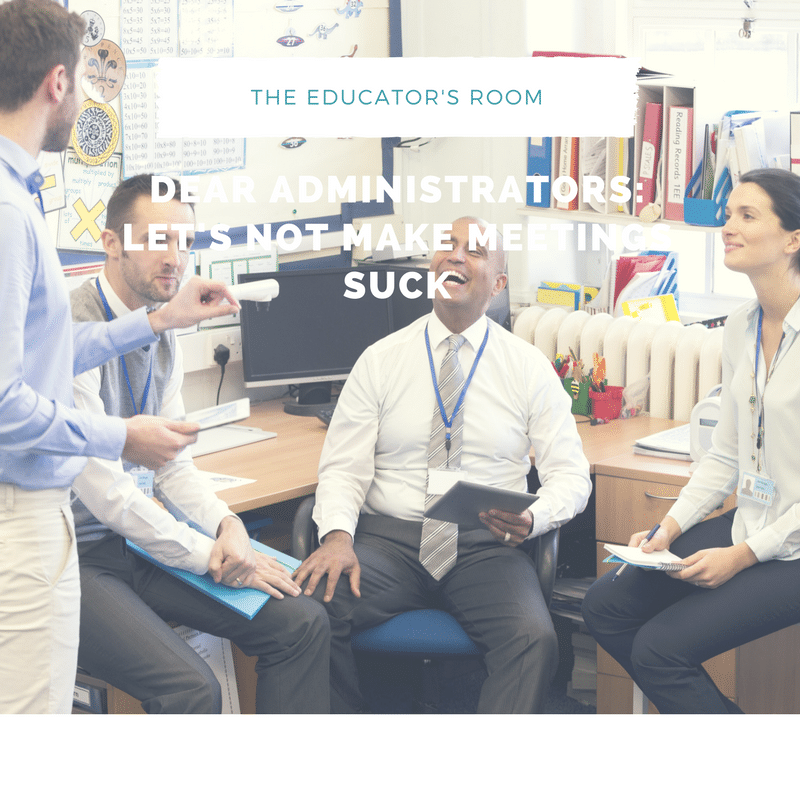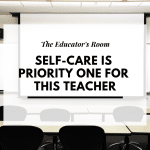It’s 3:30 pm and all of the students have finally cleared campus. You start to gather your belongings to do some grading when the dreaded voice on the intercom comes on.
“Faculty and staff our faculty meeting will start promptly at 3:45 pm. Please do not be late as we expect to go until 5:00 pm”.
You roll your eyes, here’s another wasted time to talk about everything that could be conveyed in an email.
Yes, faculty meetings suck.
It’s time to be brutally honest and use a word (suck) that made my grandmother cringe. Being an educator means sitting through an awful lot of meetings. Most of them are exactly that-awful. While meetings are a necessary evil in the current climate of accountability, the impact of meetings on school climate is up to the local administration. Just as a poorly-run meeting can deflate morale, a well-planned one can have lasting positive impact. Understanding meetings from the viewpoint of the exhausted educators sitting through them are the key to success of a school.
Teachers plan, analyze data, maximize instructional time, and parent students in-between these meetings. In a career where we’re lucky to get a bathroom break, less is more when it comes to meetings. Creating faculty-focused meetings is one-way administrators can make educators feel like respected professionals. Making deliberate decisions about how and when to hold meetings can make or break a school’s support network. Consider these suggestions from the point of view of an educator.
[bctt tweet=” In a career where we’re lucky to get a bathroom break, less is more when it comes to meetings.” via=”no”]
If it can be covered in an email, skip the meeting. Save complicated topics that involve discussion or a question and answer period for your faculty’s limited time together. Cover simple things like policies, procedures, and reminders through text and email. Do you have a handful of staff who are technologically-challenged or unlikely to check mail? Address these folks individually, provide support and go with the format that benefits the most people.
End the meeting(s) on time. Teachers are expected to plan lessons down to the minute. You honor teacher expectations when you hold yourself accountable for the same. Streamline discussion (perhaps through email) and always plan for things to take longer than expected. Nothing cheers a teacher up like being dismissed from a meeting early.
Let teachers decide when and how to meet. It may be legal to hold a meeting during planning time, but is it really the most human thing to do? Many teachers rely on planning time to accomplish daily tasks, make phone calls and send emails. For most, it is just a moment to breathe. Your staff’s well-being and productivity depend on limiting unnecessary stress. Get your faculty involved in making the schedule for your school’s battery of meetings. Find out when each team is most productive and accept that each one may work differently. If a team wants to hold a PLC at 7:00 a.m., let them go for it, and run with the motivation that comes with ownership.
Allow a time and place for the genuine exchange of ideas. Provide a way for your teachers’ ideas to be heard before meetings can turn into vent sessions. Whether it is through an anonymous suggestion box, an open door office policy, give your staff a way to head off challenges. Let your staff create solutions before problems arise. Consider calling voluntary meetings when difficult issues arise, so everyone can contribute to the solution.
Express empathy. Teaching is a demanding job. Find some little way to say “we get it” as often as possible. Food is fun, but something as simple as a silly meme can build a connection that lasts longer than a sugar buzz. Go beyond “Our school rocks!” kind of praise. Give specific, positive feedback about a job well done and don’t be afraid to be silly. A meeting is a perfect place to make a lot of people smile.
Find creative ways to supplement meetings. Make sure monthly meetings aren’t the only form of faculty communication. In addition to email and texts, get creative. The more methods of communication you use, the more likely you are to reach everyone. Maintain a notice board. Create short video meetings with flexible schedules to replace fixed meeting schedules. Try new technologies, such as Remind, Smore, and FlipSnack. Look into starting a blog or a closed social media group.
Making deliberate decisions about how you use meetings (or a lack thereof) can make a huge positive impact on exhausted educators.






